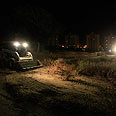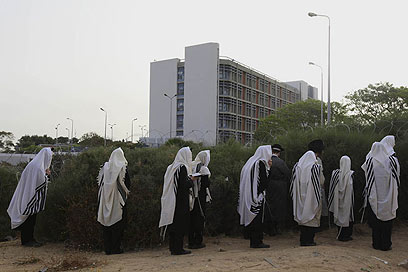
Netanyahu: Public welfare conquers haredi protests
Bulldozers, tractors arrive at Barzilai Hospital around midnight for relocation of ancient graves underway on Sunday. Netanyahu: Cabinet acts in favor of public welfare. Litzman calls move 'foolish.' Fifteen haredim detained by police following protest on site
After years of delays, capitulations, and a wave of public protest, the moment of truth has arrived. Under heavy security of hundreds of police, bulldozers, tractors and a container arrived Saturday night at Barzilai Medical Center in Ashkelon to relocate ancient graves located on the site so that a new emergency room can be erected. Workers from the Antiquities Authority began moving the graves at around 10 am on Sunday.
Prime Minister Benjamin Netanyahu said the "public welfare" had conquered ultra-Orthodox protests against the moving of the graves.
"There is an important haredi public that sees itself hurt by the decision but after checking we have reached a decision that it should be done. Public welfare conquers, this is our guideline. If we can, we confer and attempt to reach conclusions, but in the end the government's decision is according to public welfare," he said during a Cabinet meeting.

Haredim pray near site of ancient graves (Photo: Tsafrir Abayov)
Deputy Health Minister Yakov Litzman responded called the decision to move the graves "foolish."
"I can only say (former prime minister Menachem) Begin would not have made the same decision," he told Ynet before entering a cabinet meeting.
Dr. Yigal Israel of the Israel Antiquity Authority said to Ynet that work was done Saturday night to clear out weeds in the surrounding areas in preparation for the digging that would be performed by 45 archeologists. He noted, "Rabbi (Shlomo) Amar and Rabbi Ovadia (Yosef) granted permission to move the graves."
On Saturday night, some 30 haredim from Jerusalem protested on the site, and 15 were detained by the police for investigation.
Three more haredim who planned to disrupt the work at the site were detained a few hours later. According to police, the three resisted arrest and tried to assault officers at the scene. In addition, since the end of Shabbat, the police stopped a number of haredim who reached the hospital's approach road.

Removal of graves underway at Barzilai Medical Center (Photo: Tsafrir Abayov)
On Friday night, horsemen and special crowd-dispersal police units were deployed around the hospital. The police stressed that no measure would be spared and that the commanders were instructed to act as they see fit, including making arrests, in order to maintain public order.
Ashkelon Police Superintendent Haim Blumenfeld said during a briefing, "We will take action to implement the cabinet decision to evacuate the graves. We have large forces deployed, and we have stationed ourselves at a number of posts and scenarios with the objective being to allow the Antiquities Authority to carry out its work alongside regular operations of the hospital itself. We are determined to address every scenario."
According to estimates, the evacuation work will take place over a number of days. The hospital hopes the work will be completed by the Shavuot holiday. The police will secure the scene for the duration in order to prevent any attempt to thwart its completion.
Barbed-wire fences placed around the hospital ahead of the evacuation. Israel Medical Association Chairman Dr. Leonid Eidelman recently sent a letter to the police chief expressing his concern for the safety and wellbeing of the hospital staff and patients and for the smooth running o the hospital in light of disturbances sparked by opposition to the removal of the graves.
The building plan for the new emergency room was authorized more than a year and a half ago.
Deputy Health Minister Litzman, who opposed the relocation of the graves, initially succeeded in getting an alternative plan to move the new emergency room to an alternate site for a massive sum of NIS 90 million (about $24 million).
Following a wide scale public protest on the issue, which included the resignation of the director general of the Health Ministry, Prime Minister Netanyahu decided to implement the original plan.
Earlier Saturday, dozens of haredim protested and burned trash cans on Bar Ilan Street and Yehezkel Street in Jerusalem. The decision to relocate the graves evoked outrage among various elements in the Eda Haharedit, which expressed its vehement opposition to the move, claiming that the grave were of Jewish origin.
"This must be fought with devotion," said Rabbi David Shmidel, head of the haredi organization Atra Kadisha, last week.
Roi Idan and Shmulik Grossman contributed to this article










